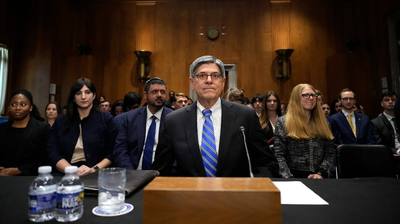
Republicans are signaling opposition to President Biden’s nominee for ambassador to Israel, Jack Lew, but are likely to allow his confirmation to proceed.
Sen. James Risch (R-Idaho), the ranking member of the Senate Foreign Relations Committee, said discussions are ongoing over whether any Republican senators may take action to block or slow down Lew’s advancement to the Senate floor.
“We’re in discussions on that. It’s one thing to be a ‘no.’ It’s another to block the inevitable. We’ll get through this,” Risch said during a press conference discussing U.S. support for Israel.
“The purpose right now is to support Israel,” Risch continued.
“I believe that the right way to support Israel is to not have Jack Lew as the ambassador. I suspect he’s going to get confirmed on a party line vote. We all want to do what’s right for Israel, if that happens of course, we’ll work with Jack Lew in the position, if he gets into that position.”
Republicans have voiced their opposition to Lew, a former Treasury secretary, criticizing his work in the Obama administration on the Iran nuclear deal, formally known as the Joint Comprehensive Plan of Action.
Top Stories from The Hill
- Biden warns Israel not to repeat mistakes of US response after 9/11
- Judge denies Trump’s attempt to delay Jan. 6 civil lawsuit
- Jordan fails to clinch Speakership on second ballot
- Gaetz apologizes to colleague, ‘anyone else who felt targeted’ by fundraising email
Republicans have further called, in the wake of Hamas’s unprecedented attack against Israel on Oct 7., for the Biden administration to freeze $6 billion of Iranian funds that the White House is working to transfer back to Iran following the release of American prisoners.
The Biden administration has said that money is only to be used for humanitarian purposes, but critics say it frees up $6 billion that Iran can use for terrorism.
“When you're dealing with Iran, you're not dealing with a rational economic player, you're dealing with an evil, malign government that funds its evil and malign activities first,” Lew said at a Senate Foreign Relations Committee confirmation hearing Wednesday.
“Sadly, supporting terrorist organizations like Hamas and terrorist organizations like Hezbollah, that's not very expensive. They're doing that anyway. I tried as hard as I could, subsequent administrations, tried as hard as they could, under maximum pressure, they still were doing their malign activities” he continued.
“So it's not a pure economic question. It's really a question of who are we dealing with? We're not dealing with people who trade off guns and butter. Guns come first.”
While Israel and the Biden administration have said they do not yet have evidence showing a direct link that Iran was involved in planning the Hamas attack on Israel, they acknowledge that the Islamic Republic is complicit in long-standing military support and financing to the group, a U.S.-designated terrorist organization.
More than 1,400 Israelis were killed in the attack in what has been described as the deadliest day for the Jewish people since the Holocaust. People were gunned down on farms, in their homes, waiting for a bus and at a music festival. Others were burned alive as their homes were set on fire. Israeli officials have compared the actions of Hamas to those of the Islamic State in arguing for the group’s eradication.
Israel has responded with a bombing campaign on the Gaza Strip, which is controlled by Hamas, that has targeted the group’s infrastructure and leadership, but also killed thousands of civilians. The aerial strikes and seige of the narrow section of land also has prompted fears of a humanitarian disaster.
An explosion Tuesday night at a hospital in Gaza has further inflamed the region, pitting much of the Arab world against the U.S. and Israel’s government. Israel, backed by the U.S., has said the explosion was the result of a misfired rocket by the group Palestinian Islamic Jihad in Gaza. Hamas has blamed an Israel strike.
Democrats say the urgency of the situation is why the Senate should work quickly to confirm Lew.
“We need an ambassador who at this critical and delicate time can speak with authority and engage diplomatically in the region at the highest level,” Sen. Ben Cardin (D-Md.), chairman of the Senate Foreign Relations Committee, said in opening remarks at Lew’s hearing.
Sign up for the latest from The Hill here
Lew was nominated by President Biden for ambassador to Israel in September after former Ambassador to Israel Tom Nides departed the post in July.
Cardin had expedited Lew’s confirmation hearing to take place Wednesday as the Senate returned to Washington for the first time since the Hamas attack on Israel. Cardin said that a business meeting will be scheduled for next week to vote on advancing Lew’s nomination out of the committee, and that will set up a vote on the Senate floor for his confirmation.
Among the most pressing issues facing Lew are the Biden administration’s efforts to recover 199 hostages taken from Israel by Hamas into Gaza, including an unknown number of Americans.
Biden officials have said that U.S. support for Israel's defense is “unconditional,” and the administration is readying an aid package to include additional military assistance. It has also raised concern over the spiraling humanitarian conditions occurring in Gaza.
Lew pointed out that while the hearing was occurring, Biden had authorized $100 million in humanitarian funds for Palestinian in the West Bank and Gaza. Israel has said it will allow aid from Egypt to enter Gaza, but its unclear if such deliveries have started.
Lew responded to a question from Sen. Jeff Merkley (D-Ore.) that he would work to help minimize the threat to civilians, if confirmed.
“I think minimizing the harm to civilians is something that is a moral obligation, that I only wish one could say that there would be no collateral damage, but in war there is. But as you say the goal is to minimize.”